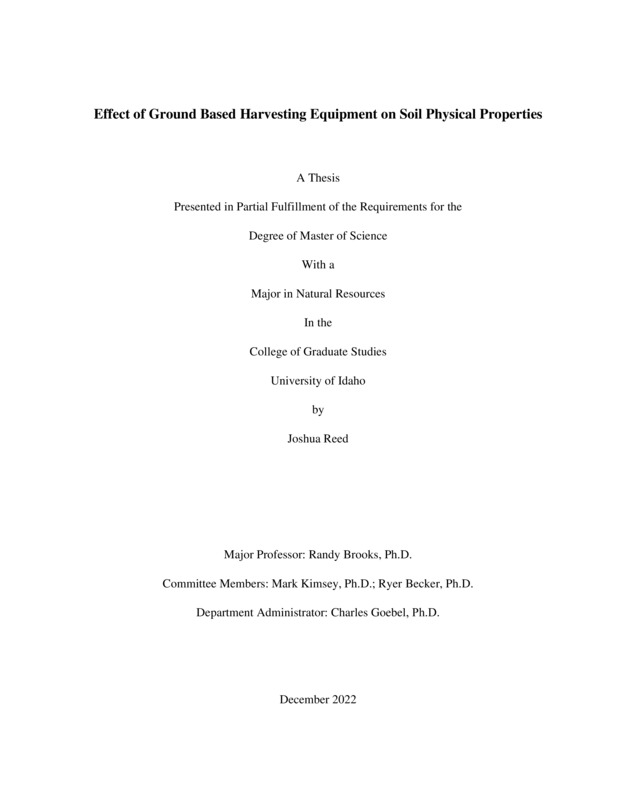Effect of Ground Based Harvesting Equipment on Soil Physical Properties
Reed, Josh. (2022-12). Effect of Ground Based Harvesting Equipment on Soil Physical Properties. Theses and Dissertations Collection, University of Idaho Library Digital Collections. https://www.lib.uidaho.edu/digital/etd/items/reed_idaho_0089n_12504.html
- Title:
- Effect of Ground Based Harvesting Equipment on Soil Physical Properties
- Author:
- Reed, Josh
- Date:
- 2022-12
- Keywords:
- Effects of ground based harvesting on soil compaction Effects of ground based harvesting on soil physical properties Ground Based Harvesting Soil Compaction
- Program:
- Natural Resources
- Subject Category:
- Forestry
- Abstract:
-
Logging in the Pacific Northwest is a key driver in local economies that are natural resource dependent. For many communities in the Pacific Northwest, logging is a livelihood that runs back many generations. The 2021 world population is about 7.8 billion human beings. With the population continuing to increase, the housing market is also on the rise, creating additional demands on logging and manufacturing of lumber. Foresters and loggers have responsibilities to steward the forests. This responsibility includes sustainable operations to ensure a future for the timber industry. There is also a major responsibility to sustain the contribution to the world supply of wood products. The environmental responsibilities that come with logging operations are crucial to creating a sustainable environment. One of the primary pieces of equipment used in ground-based logging operations is a rubber-tired skidder. Rubber-tired skidders are large tractors specifically designed to collect and skid timber for harvest and transport to a landing. During the process of harvesting and skidding trees, the forest floor experiences an exponential amount of weight and displacement. This weight causes soil compaction, and the displacement exposes mineral soil. Skidders establish primary skid trails which become heavily compacted causing the soil’s elasticity to diminish. This study examines the change in soil bulk density caused by rubber-tired skidders in different traffic intensities. The need to use rubber-tired skidders will be present and soil disturbance will not be completely avoidable. The recommendation is to limit the use of rubber-tired skidders to designated skid trails following Best Management Practices (BMPs).
- Description:
- masters, M.S., Natural Resources -- University of Idaho - College of Graduate Studies, 2022-12
- Major Professor:
- Brooks, Randall
- Committee:
- Kimsey, Mark; Becker, Ryer; Goebel, Charles
- Defense Date:
- 2022-12
- Identifier:
- Reed_idaho_0089N_12504
- Type:
- Text
- Format Original:
- Format:
- application/pdf
- Rights:
- In Copyright - Educational Use Permitted. For more information, please contact University of Idaho Library Special Collections and Archives Department at libspec@uidaho.edu.
- Standardized Rights:
- http://rightsstatements.org/vocab/InC-EDU/1.0/

